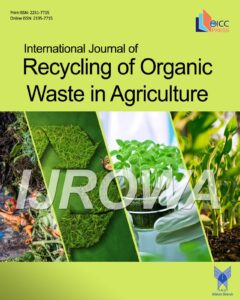Additive effect of cow dung slurry and cellulolytic bacterial inoculation on humic fractions during composting of municipal solid waste
Authors
Abstract
Purpose The work aimed to investigate the effect of cow dung and cellulolytic bacteria on humic characteristics during municipal solid waste composting. Four Bacillus isolates (B. subtilis, B. tequilensis, B. venezuelans and B. amyloliquefaciens) sourced from dumpsite soil were formulated as consortium for the study.
Methods Four treatments were considered with addition of bulking agents (ratio 1:7:6) to 15 kg MSW. Treatment Cs1 (control): only MSW, Cs2: MSW + cellulolytic bacterial inoculum @ 5 ml (2 × 109 CFU ml−1</sup>); Cs3—MSW + cow dung slurry @ 1 kg (1:100 based on wet weight) and Cs4—MSW + cellulolytic bacterial inoculum @ 5 ml (2 × 109 CFU ml−1) + cow dung slurry @ 1 kg (diluted 1:100 based on wet weight). The analyses of humic acids were done by elemental analyzer, UV and Fourier transform infrared spectroscopy during 90 days of composting.
Results MSW amended with consortia of effective microorganisms and cow dung slurry projected highest humification degree at 82.4% (P < 0.01). Highest temperature (63 °C) was recorded in the treatment Cs4 during composting. The data corresponded to an increase in H/C ratio (0.9%) with a decrease in C/N (14.8%) and O/C ratio (0.5%). In addition, most stabilized values for E4/E6 ratio (4.1) and E2/E3 ratio (2.1) were observed in Cs4. The humification indices manifest positive regression values (F (4, 1) = 0.007; P < 0.01) and 99% significant model.
Conclusion In the study, bio-augmentation (bacterial consortia and cow dung slurry) to MSW composting facilitates early maturity compared to other inoculated/uninoculated treatments. The result substantiates the effect of temperature on the humification rate of composting.



